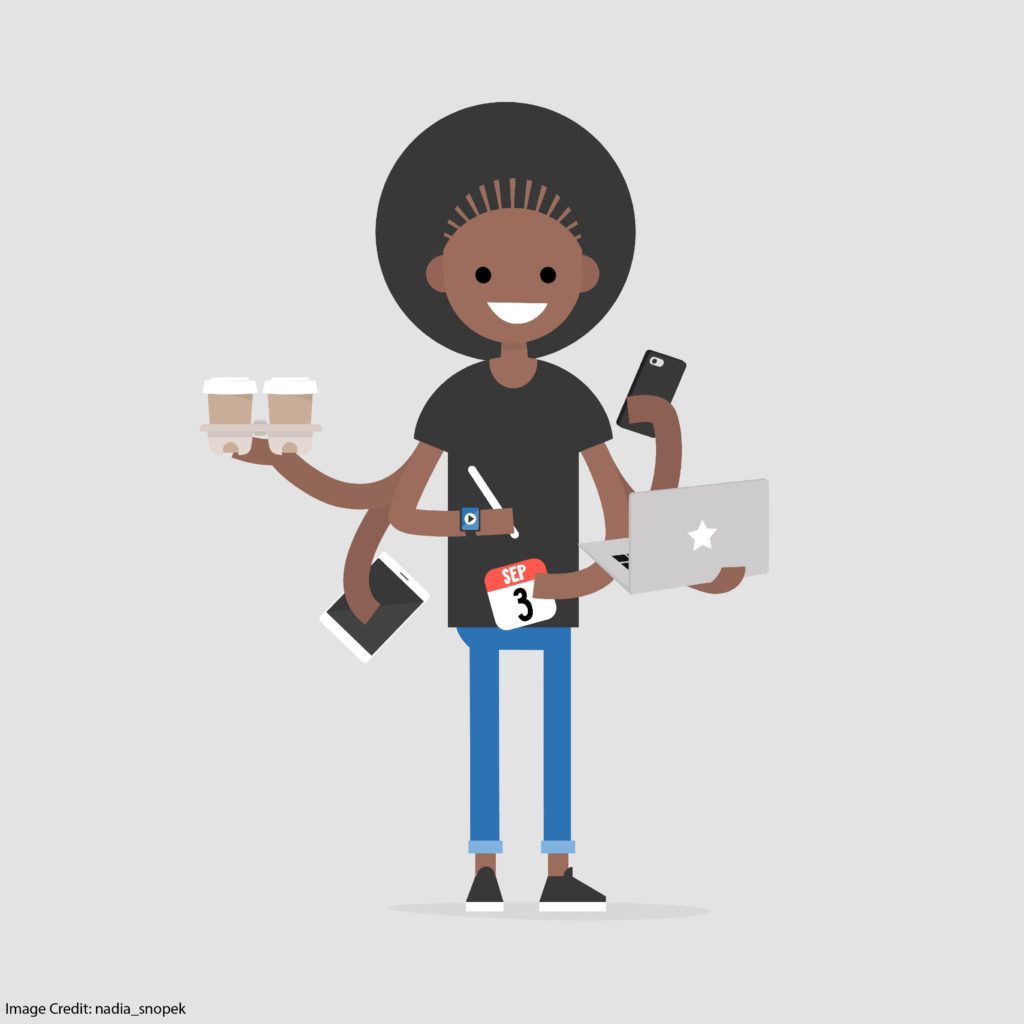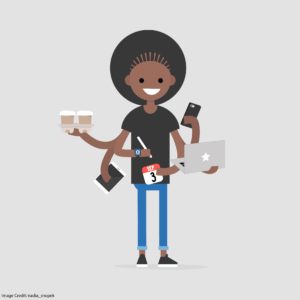Every now and then, research is just plain funny. Here’s the story:
If you’ve spent even a hot minute at a Learning and the Brain conference, you know that multitasking is not a thing.
When we undertake two cognitively demanding tasks “simultaneously,” we actually switch rapidly back and forth between them.
The result: we do worse at both.
That is: if you’re reading this blog post while listening to the news, you won’t understand or remember either very well. (That is: not as well as you would have done with each task separately.)
Where’s the funny?
In 2017, Shalena Srna published research about our perceptions of multitasking.
She found that we do better at activities when we think we’re multitasking than when we think we’re monotasking.
For instance, participants transcribed a video lecture about sharks.
Researchers told half of the participants that listening and transcribing are two different things, so they would be multitasking.
They told the other half that listening and transcribing are one thing, so they’re not multitasking.
Sure enough, the group that perceived transcription as multitasking transcribed more words, and remembered more content, than the group who perceived the same task as monotasking.
Amazing.
Srna’s team suspects that people who think they’re multitasking concentrate harder, and so do better.
Hence this paradox: people don’t multitask well, but we monotask better when we think we’re multitasking.
The Bigger Picture
So, what do we do with this comical finding?
On the one hand, I don’t think it has direct teaching implications. That is, we teachers should NOT pretend to our students that they’re multitasking so that they’ll monotask better. (Why not? Well, misleading students is usually a very bad idea…)
On the other hand, this study provides an important reminder:
Humans don’t intuitively understand how we think and learn.
We teachers (and we students) might just FEEL that a particular learning strategy works well for us. Sadly, those powerful feelings are often just plain wrong.
I can think of several research examples of this not-so-funny problem.
In 2009, Dr. Nate Kornell and Dr. Lisa Son published a study about retrieval practice.
Students learned some word pairs.
They practiced HALF of those words with simple review.
They practiced the OTHER HALF with retrieval practice.
Unsurprisingly (to the researchers — and to us), the students remembered more words after retrieval practice than after review. (About 6% more.)
Surprisingly, they PREDICTED that they would remember more words after the review. (About 7% more.)
That is: even thought they actually formed stronger memories after retrieval practice, they thought they formed stronger memories after another (less effective) strategy.
Why, because (say it with me):
Humans don’t intuitively understand how we think and learn.
Honestly, this insight is just bad news.
The Bigger Picture
Another study — actually a literature review — makes the same point more broadly.
Dr. Nick Soderstrom, working with Dr. Robert Bjork, reviewed research into short-term performance and long-term learning.
To summarize this ENORMOUS review, they found that teaching strategies which benefit short-term peformance do not consistently benefit long-term learning.
That is: imagine that I introduce a new topic in class, and give my students a quick low-stakes quiz at the end of that class. The strategies that boost class-end quizzes probably won’t help students learn well enough to demonstrate understanding on a later test.
They understood it today, but not long-term.
The Even Bigger Question: So What?
So far, these research findings have the whiff of humor.
Ain’t it funny that we monotask better when we think we’re multitasking? LOL.
In truth, this consistent finding — humans don’t intuitively understand how we think and learn — has important implications.
Here’s what I mean:
In theory, the field of Mind, Brain, and Education creates conversations among equals: psychology researchers, neuroscience researchers, and teachers/academic leaders.
In practice, this field often results in researchers telling teachers what to do.
I myself, in my own work, spent LOTS of time championing the voice of teachers.
We teachers can, should, MUST speak up for ourselves. Our experience — both individual and professional — matters in these conversations. We’re not here to obey; we’re here to share ideas for mutual benefit.
However, because “humans don’t intuitively understand how we think and learn,” we must speak up for our experience AND we must do so modestly.
We must do so with an open mind.
Yes, my experience tells me that teaching this way helps students learn.
But, my definition of “learn” is “do well on the class-end quiz.” Soderstrom shows us — very convincingly — that class-end quizzes don’t predict long-term learning and understanding. (Of course: “long-term learning and understanding” is my goal!)
Yes, my experience tells me that I can multitask! Alas, research shows I’m just monotasking efficiently.
My gut tells me that simple rereading results in more learning than retrieval practice. Alas, my gut is just plain old wrong.
In other words: we teachers should have a role in this Mind, Brain, Education conversation. To be most effective in that role — to merit that role — we must acknowledge the limitations of our insight, training and professional experience.
This balance is VERY DIFFICULT to get right. I hope we can talk more about finding a harmonious tension between speaking up and listening with humility and curiosity.
Kornell, N., & Son, L. K. (2009). Learners’ choices and beliefs about self-testing. Memory, 17(5), 493-501.
Soderstrom, N. C., & Bjork, R. A. (2015). Learning versus performance: An integrative review. Perspectives on Psychological Science, 10(2), 176-199.









